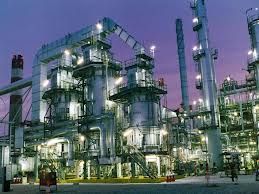
The increasingly sophisticated Russian refining industry is emerging as a key oil price driver, aided by tight European refined product stocks and the growing dominance of Russian Urals crude in European markets.
Limited alternatives to Urals, Russia's main crude oil export blend, due to North Sea production problems and the European ban on imports of Iranian oil, have given the grade unusual strength in the market this summer.
But another, less well reported factor, has been increased demand from Russian oil refineries for the crude. Russian refinery runs have marched steadily higher in recent years, boosted by a stronger domestic market and improving yields of higher value products.
For instance Russian refinery runs hit a new post-Soviet high in June, surpassing 166 million tons of oil (around 553,000 barrels per day), up 2.7 percent on the same month a year ago
Russian refiners have spent heavily to upgrade Soviet-era plants to enable them to produce refined products for export to European markets.
Exports of diesel fuel from the Baltic port of Primorsk, for instance, were expected to reach a record 680,000 tons (165,000 barrels per day) in July.
And unlike a decade ago, when these exports would be mostly lower quality "Russian gas oil" that would have needed additional refining to meet European standards, the bulk of shipments coming out of Primorsk today is ultra-low sulfur diesel.
Russia's system of oil export taxation has further encouraged a shift to refining oil locally by offering greater returns to producers who export finished products over crude oil and fuel oil.
As a result at times it makes more sense for Russian oil producers to maximize oil refining at the expense of crude oil exports, even during periods of high flat prices for crude.
Such a situation is playing out this month, according to European crude traders. Strong refining margins have allowed Russian refiners to outbid export markets for oil, limiting the amount available for sale overseas.
To be sure, the reason why Russian refiners have been able to start bidding up crude oil prices is the reluctance of European refiners to produce excess diesel fuel for storage this year.
Instead, European firms have kept crude oil runs to a minimum and run down stocks, relying on imports to balance the market when required.
But with diesel cracks now recovering to the point where refineries are willing to run a bit harder, they are finding trouble securing cheap crude.
The relatively tight supply situation for Urals crude this summer has helped keep the grade at a premium to the North Sea BFOE benchmark.
The strength in Urals is all the more remarkable given the well documented local supply issues that are distorting the BFOE market in August and September.
Not surprisingly, a look at Russian export data helps explain the strength in prices.
Although sea-borne shipments from ports in the Baltic in the North and Black Sea in the south have hit record highs this year, exports by the Druzhba pipeline to central Europe have slumped.
At a combined 3.74 million barrels per day in July, sea-borne and Druzhba exports to Europe on the Transneft system fell to their lowest level since early 2009 even as overall Russian oil output has risen by some 400,000 bpd over the same period.
Moreover, the shift in pipeline tariffs on Russia's Transneft system that has encouraged exporters to send more oil to sea terminals at the expense of the Druzhba pipeline has intensified competition for cargoes of Urals.
Transneft is reportedly seeking to maximize throughputs at its new Baltic terminal at Ust-Luga to help repay loans taken out to finance its construction.
Coming at the same time as the European Union's ban on the import of Iranian crude oil, much of which is comparable in quality to Urals, the tightness in Russian westbound exports has been keenly felt.
Of course, a major factor here is Russian government policy, particularly export duties.
A change in tariff policy that favors crude oil exports over refined products, for instance, would doubtless trigger a flood of crude into the market and a corresponding drop off in exports of finished fuels.
Like other oil exporters, Russia is entitled to seek maximum prices for its production and undoubtedly will do so given the importance of oil revenues to the federal budget.
Already a guiding policy for exports has been to shift toward new markets, such as China, to reduce Russia's reliance on the Atlantic basin and increase its pricing power.
The continued development of the Russian refining sector will likely further enhance this market power.
Source: MENAFN - Arab News
We use cookies to improve your experience. By continuing to use our site, you accept our Cookies, Privacy Policy,Terms and Conditions. Close X